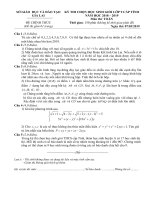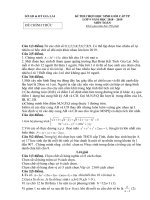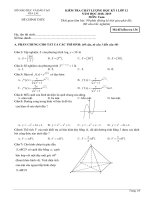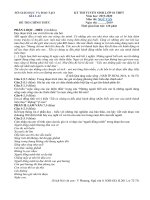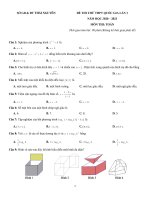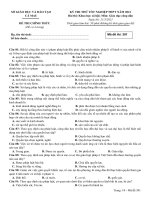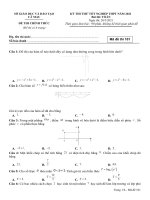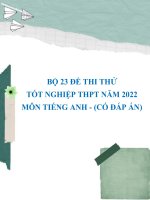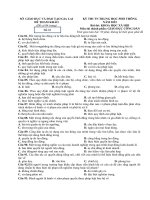Đề thi thử tốt nghiệp THPT năm 2022 môn Tiếng Anh có đáp án - Sở GD&ĐT Gia Lai
Bạn đang xem bản rút gọn của tài liệu. Xem và tải ngay bản đầy đủ của tài liệu tại đây (953.38 KB, 16 trang )
SỞ GIÁO DỤC VÀ ĐÀO TẠO GIA LAI
KỲ THI TỐT NGHIỆP THPT NĂM 2022
ĐỀ THI THAM KHẢO
BÀI THI: NGOẠI NGỮ; MƠN THI:TIẾNG ANH
(Đề thi gồm có 05 trang)
Thời gian làm bài: 60 phút, không kể thời gian phát đề
ĐỀ THI SỐ 01
Mark the letter A, B, C, or D on your answer sheet to indicate the word whose underlined
part differs from the other three in pronunciation in each of the following questions.
Question 1: A. worked
B. called
C. loved
D. changed
Question 2: A. face
B. place
C. gap
D. gate
Mark the letter A, B, C, or D on your answer sheet to indicate the word whose underlined part
differs from the other three in the position of primary stress in each of the following questions.
Question 3: A. cartoon
B. answer
C. movie
D. paper
Question 4: A. discussion B. assistant
C. character
D. director
Mark the letter A, B, C, or D on your answer sheet to indicate the correct answer to each
of the following questions.
Question 5: You haven’t seen Mary today, ________?
A. have you
B. haven’t you
C. have not you
D. do you
Question 6: The application form ________to the university before May 31st.
A. must send
B. sent
C. must be sending D. must be sent
Question 7: ________ Christmas Eve, people often have parties late at midnight.
A. in
B. at
C. on
D. from
Question 8: The faster we walk, ________we will get there.
A. the soonest
B. the soon
C. the more soon
D. the sooner
Question 9: Indiana University, one of the largest ones in the nation, is located in a_______
town.
A. small beautiful Midwestern
B. beautiful Midwestern small
C. Midwestern beautiful small
D. beautiful small Midwestern
Question 10: The train ________ half an hour ago.
A. has been leaving B. left
C. has left
D. had left
Question 11: ________ the weather forecast spoke of wind and rain, we really enjoyed a
warm and sunny afternoon.
A. However
B. Although
C. Yet
D. But
Question 12: As soon as I ________ a good look at the designs, I ________them back to you.
A. have had/ sent
B. have had / will send
C. had / send
D. will have / send
Question 13: Florida, ________ the Sunshine State, attracts many tourists every year.
A. is
B. known as
C. is known as
D. that is known as
Question 14: I am ________ at paying my bills on time.
A. hopeful
B. hopeless
C. hope
D. hoping
Question 15: Every year several languages ________. Some people think that this is not
important because life will be easier if there are fewer languages in the world.
A. die down
B. die out
C. die off
D. die away
Question 16: The computer has had an enormous ________ on the way we work and enjoy life.
A. impression
B. influence
C. change
D. alternation
Question 17: On some TV channels, a(n) ________ tells you what the next programme is
going to be.
A. commentator
B. announcer
C. producer
D. journalist
Question 18: Students who study far from home often have problems with ________.
A. houses
B. rooms
C. flats
D. accommodation
Question 19: Making mistakes is all ________ of growing up.
A. chalk and cheese B. cats and dogs
C. part and parcel D. here and there
Mark the letter A, B, C, or D on your answer sheet to indicate the word(s) CLOSEST in
meaning to the underlined word(s) in each of the following questions.
Question 20: There was a long period without rain in the countryside last year, so the
harvest was poor.
A. famine
B. flood
C. epidemic
D. drought
Question 21: The International Union for Conservation of Nature Red List is a
comprehensive catalogue of the conservation status of species.
A. complete
B. rational
C. understandable D. valuable
Mark the letter A, B, C, or D on your answer sheet to indicate the word(s) OPPOSITE in
meaning to the underlined word(s) in each of the following questions.
Question 22: Your experience with oil well fires will be invaluable to the company in case
of trouble
A. precious
B. priceless
C. important
D. worthless
Question 23: I had no idea that you and he were on such intimate terms. I thought you
were only casual acquaintances.
A. were hostile to each other
B. behaved well toward each other
C. hardly knew each other
D. were such close friends
Mark the letter A, B, C, or D on your answer sheet to indicate the sentence that best
completes each of the following exchanges
Question 24: Lan and Nam are discussing on leaving school of students
Lan: Should students be allowed to leave school when they are 14?
Nam: ________.
A. I don't think so. I think it is very important to have a good education.
B. Who wants to leave school at the age of 14?
C. It is a hard decision.
D. Students can't have their own choice at the age of 14.
Question 25: Mike and Lane are neighbors. They are talking about Lane's party.
Mike: “Thank you for a lovely evening”.
Lane: “________”
A. It depends on you.
B. Thank you very much indeed.
C. Yeah. I'm really looking forward to it. D. You are welcome.
Read the following passage and mark the letter A, B, C, or D on your answer sheet to indicate
the correct word or phrase that best fits each of the numbered blanks from 26 to 30.
Family life
At present, single-parent families ought to be of great focus, be recognized and
supported as they are a growing family form and should not be an afterthought in family,
economic and labor market policies. Single parent families should be (26) ________
considered and addressed in all family policy discussions and decisions. (27) ________,
home-care cash allowances, which are paid to a parent who abstains from employment to
take care for her child at home, can have significant consequences encouraging lower levels
of female employment among single-parent families, (28) ________ in turn results in higher
childhood poverty. In this regard, work-life balance policies and workplace practices also
need to (29) ________ a single-parent perspective, for example, the impact of non-standard
work hours when childcare is not available.
The provision of educational and skill-building opportunities and affordable quality
day care become even more urgent in families with single parents. Such families should
have a higher priority and subsidized access to childcare facilities. Governmental agencies
should be established to facilitate child support payment from (30) ________ parents in case
of conflicts, disagreements or delayed payments, e.g., after a divorce or separation.
Question 26: A. implicitly
B. clearly
C. indirectly
D. completely
Question 27: A. For instance
B. However
C. Moreover
D. Therefore
Question 28: A. who
B. whose
C. which
D. that
Question 29: A. take responsible for B. take in hand
C. take no notice of D. take account of
Question 30: A. non-resident
B. happy
C. single
D. couple
Read the following passage and mark the letter A, B, C, or D on your answer sheet to
indicate the correct answer to each of the questions from 31 to 35.
Most of us tend to think of production when we think of mass media industries.
After all, it is the output of this production–the papers we read, the cable TV shows we
watch–that grab our attention, make us happy or angry, interested or bored. Moreover,
most public discussion about mass communication tends to be about production. The latest
gossip about that actor will be in what film, the angry comments a mayor makes about the
violence on local TV news, the newest CDs by an up-and-coming group – these are the
kinds of topics that focus our attention on the making of content, not its distribution or
exhibition.
Media executives know, however, that production is only one step in the arduous
and risky process of getting a mass media idea to an audience. Distribution is the delivery
of the produced material to the point where it will be shown to its intended audience. The
activity takes place out of public view. We have already mentioned the NBC acts as a
distributor when it disseminates television programming via satellite to TV stations.
When Philadelphia Newspapers Inc. delivers its Philadelphia Inquirerto city newsstands,
when Twentieth – Century – Fox moves its Musicland stores, they are involved
indistribution to exhibitions.
Question 31. In this passage, “arduous” means________.
A. difficult
B. lucrative
C. lengthy
D. free
Question 32. The passage states that people tend to focus on production
because________.
A. it takes place out of public view
B. mass media companies do not own production divisions
C. the output of mass media is intended to grab our attention
D. companies can function as both producers and distributors
Question 33. In this passage, to “disseminate” means to________.
A. create
B. send out
C. take in
D. fertilize
Question 34. This passage states that distribution is________.
A. the first step in mass media production
B. the most talked-about step in mass media production
C. at least as important as production
D. not as important as exhibition
Question 35. The author’s purpose in writing this passage is to________.
A. tell an interesting story
B. define a concept clearly
C. describe a scene vividly
D. argue with the reader
Read the following passage and mark the letter A, B, C, or D on your answer sheet to
indicate the correct answer to each of the questions from 36 to 42.
In America, when dining, people consider it rude for a guest or dining partner to belch or
burp, eat with an open mouth, smack, or lick your fingers. Napkins, generally provided are
available at every meal and should be placed in one's lap and then used throughout the meal to
clean one's fingers and mouth.
It is acceptable to refuse additional servings of food by saying "No, thank you" and the host
or hostess will not be insulted if you do so. Similarly, if you leave a small amount of uneaten food
on your plate at a restaurant or in a home, it is not considered an insult. If you eat everything on
the plate, a host or hostess may possibly feel that they have not prepared enough food and might
be embarrassed. People in the United States serve and eat food with either hand, but never take
food from a communal serving dish with their hands. Generally, a serving utensil is used.
Americans typically use forks, spoons and knives to eat, but there are some types of foods
that are acceptable to eat with one's fingers, like sandwiches or pizza. When in doubt, look to see
what others are doing. In formal dining situations, if you wonder whether or not it is acceptable to
begin eating, you should wait until the oldest woman (or oldest man if no women are present)
begins to eat. When eating, do not pick up the bowl or plate from the table to hold underneath
your mouth. Even noodles, soup, and rice are eaten with the plate or bowl remaining on the table.
When consuming soup and hot liquids, it is considered impolite to slurp - do not do this. When
consuming noodles, twirl them around your fork and then put it in your mouth.
If you are a man taking out a woman for dinner, you are almost always expected to pay.
This is for the woman to gauge your intentions and interest with her. For example, taking a
woman for coffee, versus tacos, versus a fancy dinner, versus for drinks at 11:30 pm, all signal
many different things to them. So, the date is a "test" of many. Paying is just as important as
where you take her, and how late. So, don't assume she is just trying to get a "free meal". Most
girls aren't. Also, if you are going out with a friend to eat, almost always, the bill is expected to be
split in half, or each person pays for themselves.
If you are eating in a restaurant, you will be expected to add a 15 to 20 % tip for the server
to your bill. In America, wait staff might occasionally stop by your table to ask how your meal is,
which is considered good service. They will also bring you your check when it seems reasonable
that you are finished with your meal, however, this is not necessarily an indication that you must
leave right away (Do not be too embarrassed to ask for the check either: waiters and waitresses
cannot read minds.) Take your time to finish your meal, and unless there is a line of people
waiting at the door, it is not considered rude to linger at your table for as long as you like.
(Adapted fromwww.tripadvisor.com)
Question 36: Which of the following could be the best title of the passage?
A. What is acceptable in dining etiquette in America?
B. Polite behavior at American’s restaurants.
C. Table etiquette in America.
D. What should we do when being invited to the American’s dinner?
Question 37: According to the passage, what action may make the American unpleasant?
A. Eating food with the guests’ hands.
B. Leaving the left-overs on the plate.
C. Cleaning the food on the fingers by the tongue.
D. Refusing the supplementary food they serve.
Question 38: What sentence is NOT stated in the passage?
A. In America, the dishes are expected to remain on the table.
B. Food is sometimes delivered from the communal serving dish with people’s hands.
C. In formal dinners, the eldest often eat first.
D. It is not courteous to slurp when eating soup.
Question 39: The word "it” in paragraph 3 refers to ________.
A. soup
B. your fork
C. your mouth
D. noodles
Question 40: What could the word "gauge” in paragraph 4 best be replaced by?
A. impress
B. estimate
C. determine
D. express
Question 41: Which of the following can be inferred from the passage?
A. It is impolite if you give extra money for the waiter.
B. Imitating others if you are not sure what to do at the meal is a good idea.
C. Paying meals for others may insult them.
D. Whenever you receive your bill, you should think of leaving soon.
Question 42: The word "linger" in the last paragraph is closest in meaning to ________.
A. appear
B. arrange
C. reserve
D. remain
Mark the letter A, B, C or D on your answer sheet to indicate the underlined part that
needs correction in each of the following questions.
Question 43: She has disappeared three days ago, and they are still looking for her now.
A
B
C
D
Question 44: Ozone has his origin in a number of sources, a prime on being the
automobile engine. A
B
C D
Question 45: Composer Richard Rodgers and lyricist Oscar Hammerstein brought to the
A
musical Oklahoma extensive musical and theatrical backgrounds as well as familiar with
B
C
The traditional forms of operetta and musical comedy.
D
Mark the letter A, B, C, or D on your answer sheet to indicate the sentence that is closest
in meaning to each of the following questions
Question 46. I haven't met my grandparents for five years.
A. I often met my grandparents five years ago.
B. I last met my grandparents five years ago.
C. I have met my grandparents for five years.
D. I didn't meet my grandparents five years ago.
Question 47: “I’ll tell you about this tomorrow, Mary.” said Tom.
A. Tom said to Mary that he will tell her about that the next day.
B. Tom told Mary that I would tell you about that the next day.
C. Tom told Mary that he would tell her about that the next day.
D. Tom told Mary that she would tell him about that the next day.
Question 48: Harry no longer smokes a lot.
A. Harry now smokes a lot.
B. Harry used to smoke a lot.
C. Harry didn’t use to smoke a lot.
D. Harry rarely smoked a lot.
Mark the letter A, B, C, or D on your answer sheet to indicate the sentence that best
combines each pair of sentences in the following questions
Question 49: The burglar might come back. You’d better change all the locks.
A. If you don’t change all the locks, the burglar could come back.
B. The burglar will come back unless you change all the locks.
C. You’d better change all the locks or the burglar will come back.
D. You’d better change all the locks in case the burglar will come back.
Question 50: Smoking is unhealthy. It also costs governments billions of dollars in
health-care costs.
A. Not only is smoking unhealthy but it also costs government billions of dollars in
health-care costs.
B. Whereas smoking is unhealthy, it costs government billions of dollars in health-care costs.
C. If smoking is unhealthy, it will cost government billions of dollars in health-care costs.
D. Smoking is so unhealthy that it costs government billions of dollars in health-care costs.
_______THE END___
SỞ GIÁO DỤC VÀ ĐÀO TẠO GIA LAI
KỲ THI TỐT NGHIỆP THPT NĂM 2022
ĐÁP ÁN ĐỀ THI THAM KHẢO
BÀI THI: NGOẠI NGỮ MƠN THI:TIẾNG ANH
(Đáp án gồm có 09 trang)
Thời gian làm bài: 60 phút, không kể thời gian phát đề
ĐỀ THI SỐ 01
Mark the letter A, B, C, or D on your answer sheet to indicate the word whose underlined
part differs from the other three in pronunciation in each of the following questions.
Question 1: A. worked
B. called
C. loved
D. changed
Đáp án: A. worked phát âm /t/, 3 từ còn lại phát âm /d/
Question 2: A. face
B. place
C. gap
D. gate
Đáp án: C. /gỉp/ , 3 từ cịn lại phát âm /ei/
Mark the letter A, B, C, or D on your answer sheet to indicate the word whose underlined
part differs from the other three in the position of primary stress in each of the following
questions.
Question 3: A. cartoon
B. answer
C. movie
D. paper
Đáp án: A. Cartoon nhấn âm 2, 3 từ còn lại nhấn âm 1
Question 4: A. discussion
B. assistant
C. character
D. director
Đáp án: C character nhấn âm 1, 3 từ còn lại nhấn âm 2
Mark the letter A, B, C, or D on your answer sheet to indicate the correct answer to each
of the following questions.
Question 5: You haven’t seen Mary today, ________?
A. have you
B. haven’t you
C. have not you
D. do you
Đáp án: A. Mệnh đề chính dạng phủ định thì hiện tại hồn thành đuôi là khẳng
định.
Question 6: The application form ________to the university before May 31st.
A. must send
B. sent
C. must be sending D. must be sent
Đáp án: D. Bị động. Căn cứ vào nghĩa, ta cần chia động từ ở thể bị động vì “bảng
đăng ký” phải được gửi đi. Do đó động từ chia ở bị động và ở dạng MUST + BE +V3/ED
Question 7: ________ Christmas Eve, people often have parties late at midnight.
A. in
B. at
C. on
D. from
Đáp án C . Dùng on Christmas Eve: Là vào ngày giáng sinh (lúc này Christmas Eve là một
ngày cụ thể nên ta dùng on)
- Dùng at Christmas: Là vào dịp giáng sinh (Christmas là một dịp, một giai đoạn có nhiều
ngày, khơng nói ngày cụ thể)
Question 8: The faster we walk, ________we will get there.
A. the soonest
Đáp án: D.
B. the soon
C. the more soon
D. the sooner
So sánh kép. Vì soon là tính từ ngắn phải thêm –er => sooner
Ta có cấu trúc: The more/-er/less +S+V, the more/-er/less +S+V.
Question 9: Indiana University, one of the largest ones in the nation, is located in a_______
town.
A. small beautiful Midwestern
C. Midwestern beautiful small
B. beautiful Midwestern small
D. beautiful small Midwestern
Đáp án: D. Kiến thức: Trật tự tính từ
Giải thích: Theo quy tắc trật tự tính từ trong câu: OSASCOMP
beautiful – Opinion; small – Size; Midwestern – Origin
Question 10: The train ________ half an hour ago.
A. has been leaving
B. left
C. has left
D. had
left
Đáp án: B. Thì quá khứ đơn, dấu hiệu ago
Question 11________ the weather forecast spoke of wind and rain, we really enjoyed a
warm and sunny afternoon.
A. However
B. Although
C. Yet
D. But
Đáp án: B. 2 mệnh đề tương phản nhau dùng Although + S+ V
(Mặc dù dự báo thời tiết có gió và mưa nhưng chúng tơi vẫn tận hưởng một buổi chiều có
nắng và ấm áp.)
Question 12: As soon as I ________ a good look at the designs, I ________ them back to
you.
A. have had/ sent
B. have had / will send
C. had / send
D. will have / send
Đáp án: B. Mệnh đề trạng ngữ chỉ thời gian As soon as + S + HTHT/HTĐ, S + will + Vo
Question 13: Florida, ________ the Sunshine State, attracts many tourists every year.
A. is
B. known as
C. is known as
D. that is known as
Đáp án: B
Florida, which is known as this Sunshine State, attracts many tourists every year.
Florida, known as this Sunshine state, attracts many tourists every year. (rút gọn
mệnh đề quan hệ ở dạng câu bị động)
- Không dùng that trong mệnh đề quan hệ có dấu phẩy (có danh từ riêng)
Question 14: I am ________ at paying my bills on time.
A. hopeful
B. hopeless
C. hope
D. hoping
Đáp án: B. Cụm từ to be hopeless at: vô vọng.
Question 15: Every year several languages ________. Some people think that this is not
important because life will be easier if there are fewer languages in the world.
A. die down
B. die out
C. die off
D. die away
Đáp án: B. A: die down: Để giảm nguồn cung của một cái gì đó đã được tạo ra trong
một khoảng thời gian; B: die out : to become less common and finally stop existing; trở nên
ít phổ biến hơn và cuối cùng dừng tồn tại; C: die off: (of the members of a group)
to stop living, one by one, until there are none left; ngừng sống, từng người một, cho đến
khi khơng cịn ai; D. die away: If something, especially a sound, dies away,
it gradually becomes reduced until it stops existing or disappears; nhỏ dần, tắt dần.
Question 16: The computer has had an enormous ________ on the way we work and enjoy
life.
A. impression
B. influence
C. change
D. alternation
Đáp án: B. Have an influence on : Có ảnh hưởng đến…
Question 17: On some TV channels, a (n) ________ tells you what the next programme is
going to be.
A. commentator
B. announcer
C. producer
D. journalist
Đáp án: B. A: commentator: nhà bình luận, thuyết minh
(a reporter for radio or television who provides a spoken description ofand remarks on
an event, especially a sports competition, as it happens); B: announcer: người thơng báo,
dẫn chương trình (someone who introduces programmes or reads the news on
the television or radio) C: producer: nhà sản xuất (a person who makes
the practical and financial arrangements needed to make a film, play,
or television or radio programme); D: journalist: nhà báo (a person who
writes news stories or articles fora newspaper or magazine or broadcasts themon radio or tel
evision)
Question 18: Students who study far from home often have problems with ________.
A. houses
B. rooms
C. flats
D. accommodation
Đáp án: D. (Những học sinh mà sống xa nhà thường có vấn đề về chỗ ở)
Question 19: Making mistakes is all ________of growing up.
A. chalk and cheese B. cats and dogs
C. part and parcel D. here and there
Đáp án: C. part and parcel of something: phần thiết yếu của cái gì; chalk and
cheese: hồn tồn khác biệt; here anh there: khắp mọi nơi; cats and dogs: mưa to (Mắc sai
lầm là phần thiết yếu của sự trưởng thành.)
Mark the letter A, B, C, or D on your answer sheet to indicate the word(s) CLOSEST in
meaning to the underlined word(s) in each of the following questions.
Question 20: There was a long period without rain in the countryside last year, so the
harvest was poor.
A. famine.
B. flood
C. epidemic
D. drought
Đáp án: D. A: famine (n): nạn đói
B: flood (n): lũ lụt; C: drought (n): hạn hán
D: epidemic (n): bệnh dịch (Có một khoảng thời gian dài khơng có mưa ở đất nước
này vào năm ngối nên mùa màng đói kém).
Question 21: The International Union for Conservation of Nature Red List is a
comprehensive catalogue of the conservation status of species.
A. complete
B. rational
C. understandable D. valuable
Đáp án: A. Comprehensive: bao quát; toàn diện; A:Complete: đầy đủ, trọn vẹn; B:
Rational: hợp lý, phải lẽ; C:Understandable: có thể hiểu được; D: Valuable: có giá trị lớn,
quý báu.=> từ gần nghĩa nhất là complete (Danh sách đỏ quốc tế về Bảo tồn Thiên nhiên là
một danh mục toàn diện về tình trạng bảo tồn các lồi)
Mark the letter A, B, C, or D on your answer sheet to indicate the word(s) OPPOSITE in
meaning to the underlined word(s) in each of the following questions.
Question 22: Your experience with oil well fires will be invaluable to the company in case
of trouble
A. precious
B. priceless
C. important
D. worthless
Đáp án: D. A. precious:of great value because of being rare, expensive, or important:
quý giá, quý báu; B.priceless: vô giá (A priceless object has such a
high value, especially because it is rare, that the price of it cannot be calculated); C.
important: quan trọng; D. worthless: không có giá trị (= having no value in money,
not important or not useful); => Invaluable: extremely useful: vô cùng quý giá >< worthless
( Kinh nghiệm của bạn đối với các vụ hỏa hoạn dầu hỏa sẽ là vô giá đối với công ty khi xảy
ra vấn đề.)
Question 23: I had no idea that you and he were on such intimate terms. I thought you
were only casual acquaintances.
A. were hostile to each other
B. behaved well toward each other
C. hardly knew each other
D. were such close friends
Đáp án: A. be on intimate terms: có mối quan hệ thân thiết; A.were hostile to each
other: thù địch với nhau; B.behaved well toward each other: cư xử tốt với nhau;C.hardly
knew each other: hầu như không biết nhau; D.were such close friends: là bạn thân => were
on such intimate terms: có mối quan hệ thân thiết >< were hostile to each other: thù địch với
nhau.(Tôi không biết rằng bạn và anh ấy lại thân thiết đến vậy. Tôi nghĩ bạn chỉ là quen
biết thông thường.)
Mark the letter A, B, C, or D on your answer sheet to indicate the sentence that best
completes each of the following exchanges
Question 24: Lan and Nam are discussing on leaving school of students
Lan: Should students be allowed to leave school when they are 14?
Nam: ________
A. I don't think so. I think it is very important to have a good education.
B. Who wants to leave school at the age of 14?
C. It is a hard decision.
D. Students can't have their own choice at the age of 14.
Đáp án: A
Dịch: Lan và Nam đang nói chuyện về việc nghỉ học của học sinh
Lan: Học sinh nên được cho phép nghỉ học khi chúng 14 tuổi
Nam: ________
A. Tôi không nghĩ như vậy. Tôi nghĩ rằng rất quan trọng để có giáo dục tơt
B. Ai muốn nghỉ học ở độ tuổi 14
C. Nó là một quyết định khó
D. Học sinh khơng thể có sự lựa chọn ở độ tuổi 14
Question 25: Mike and Lane are neighbors. They are talking about Lane's party.
Mike: “Thank you for a lovely evening”.
Lane: “________”
A. It depends on you.
B. Thank you very much indeed.
C. Yeah. I'm really looking forward to it. D. You are welcome.
Đáp án: D
A. It depends on you: Tùy bạn thôi.
B. Thank you very much indeed: Thực sự rất cảm ơn bạn.
C. Yeah. I'm really looking forward to it: Yeah. Tơi thực sự rất mong đợi điều đó.
D. You are welcome: Khơng có gì.
Khi được người khác cảm ơn, ta dùng “You are welcome” để đáp lại.
Dịch nghĩa. Mike và Lane là hàng xóm. Họ đang nói chuyện về bữa tiệc của Lane.
Mike: Cảm ơn cậu vì bữa tối tuyệt vời!
Lane: Khơng có gì đâu.
Read the following passage and mark the letter A, B, C, or D on your answer sheet to
indicate the correct word or phrase that best fits each of the numbered blanks from 26 to
30.
Family life
At present, single-parent families ought to be of great focus, be recognized and
supported as they are a growing family form and should not be an afterthought in family,
economic and labor market policies. Single parent families should be (26) ________
considered and addressed in all family policy discussions and decisions. (27) ________,
home-care cash allowances, which are paid to a parent who abstains from employment to
take care for her child at home, can have significant consequences encouraging lower levels
of female employment among single-parent families, (28) ________in turn results in higher
childhood poverty. In this regard, work-life balance policies and workplace practices also
need to (29) ________ a single-parent perspective, for example, the impact of non-standard
work hours when childcare is not available.
The provision of educational and skill-building opportunities and affordable quality
day care become even more urgent in families with single parents. Such families should
have a higher priority and subsidized access to childcare facilities. Governmental agencies
should be established to facilitate child support payment from (30) ________parents in case
of conflicts, disagreements or delayed payments, e.g., after a divorce or separation.
Question 26: A. implicitly
B. clearly
C. indirectly
D. completely
Đáp án B. A. implicitly: một cách khơng trực tiếp, ngầm; hồn tồn; B. clearly: một
cách rõ ràng, dễ hiểu; C.indirectly: một cách gián tiếp, không rõ ràng;D. completely: một
cách hồn tồn, tuyệt đối. (Những gia đình cha hoặc mẹ đơn thân nên được xem xét một
cách rõ ràng và được ghi tên trong tất cả các thảo luận và quyết định về chính sách gia
đình).
Question 27: A. For instance
B. However
C. Moreover
D. Therefore
Đáp án A. A. for instance = for example: ví dụ, chẳng hạn; B. however: tuy nhiên;
C. moreover: hơn nữa, ngoài ra, vả lại; D. therefore: do đó, do vậy, vì lẽ đó…* “for
instance” dùng để đưa ra bằng chứng cho giả thiết câu trước. (Chẳng hạn, những khoản
trợ cấp tiền mặt cho việc chăm sóc tại nhà, cái mà được dành cho bố/mẹ nghỉ việc để chăm
sóc con cái họ ở nhà, có thể có những tác động đáng kể khuyến khích mức độ phụ nữ ra
ngồi làm việc thấp hơn giữa những gia đình cha/mẹ đơn thân).
Question 28: A. who
B. whose
C. which
D. that
Đáp án C. A. who: thay thế cho danh từ chỉ người; B. whose:thay thế đại từ quan hệ
chỉ sự sở hữu; C. which: thay thế cho danh từ chỉ vật/ mệnh đề; D. that: thay thế cho danh từ
chỉ người/ vật/ người + vật. *Vì sau “whose” cần N nên loại B; trước “that” khơng được có
dấu “,” nên loại D và đại từ quan hệ cần điền không phải thay thế cho N chỉ người nên loại
A. *Như vậy, chọn “which” thay thế cho cả một mệnh đề phía trước. (có thể có những tác
động đáng kể khuyến khích mức độ phụ nữ ra ngoài làm việc thấp hơn giữa những gia đình
cha/mẹ đơn thân, điều mà vì thế sẽ gây ra mức độ nghèo đói cho trẻ em cao hơn).
Question 29: A. take responsible for
B. take in hand
C. take no notice of
D. take account of
Đáp án: D. A. take responsible for (coll): chịu trách nhiệm cho cái gì; B. take in
hand = be in charge of sb/sth (coll): chịu trách nhiệm; C. take no notice of (coll): không chú
ý, để ý đến ai/ cái gì; D. take account of sth= take sth into account (coll): xem xét, cân nhắc
kĩ điều gì. (Xét về mặt này, các chính sách cân bằng giữa công việc- cuộc sống và nơi làm
việc cũng là một khía cạnh của ơng bố/bà mẹ đơn thân cần phải xem xét kĩ, chẳng hạn là
những tác động của giờ giấc làm việc không chuẩn mực khi việc chăm sóc trẻ là khơng sẵn
có). :
Question 30 A. non-resident
B. happy
C. single
D. couple
Đáp án A. A. non-resident: không nơi ở; B. happy: hạnh phúc; C. single: đơn thân;
D. couple: cặp đôi. *Vị trí cần một “tính từ” bổ sung nghĩa cho parents (in case of conflicts,
disagreements or delayed payments), nên chọn đáp án A. (Các cơ quan chính phủ nên được
thiết lập để tạo điều kiện thuận lợi trong những khoản hỗ trợ trẻ em có cha mẹ khơng nơi ở
trong những trường hợp xích mích, bất đồng hay những khoản thanh toán kéo dài, chẳng
hạn sau li dị hoặc ly thân).
Read the following passage and mark the letter A, B, C, or D on your answer sheet to
indicate the correct answer to each of the questions from 31 to 35.
Most of us tend to think of production when we think of mass media industries. After
all, it is the output of this production–the papers we read, the cable TV shows we
watch–that grab our attention, make us happy or angry, interested or bored. Moreover,
most public discussion about mass communication tends to be about production. The
latest gossip about that actor will be in what film, the angry comments a mayor makes
about the violence on local TV news, the newest CDs by an up-and-coming group –
these are the kinds of topics that focus our attention on the making of content, not its
distribution or exhibition.
Media executives know, however, that production is only one step in the arduous and
risky process of getting a mass media idea to an audience. Distribution is the delivery
of the produced material to the point where it will be shown to its intended audience.
The activity takes place out of public view. We have already mentioned the NBC acts
as a distributor when it disseminates television programming via satellite to TV
stations. When Philadelphia Newspapers Inc. delivers its Philadelphia Inquirerto city
newsstands, when Twentieth – Century – Fox moves its Musicland stores, they are
involved indistribution to exhibitions.
Question 31. In this passage, “arduous” means________.
A. difficult
B. lucrative
C. lengthy
D. free
Đáp án: A. Difficult ( khó khăn): có thể đúng vì q trình làm nên các sản phẩm
truyền thông không phải dễ dàng /B. lucrative (sinh lợi)/C. lengthy (dài dòng) D. free (tự
do.
Question 32. The passage states that people tend to focus on production because .
A. it takes place out of public view
B. mass media companies do not own production divisions
C. the output of mass media is intended to grab our attention
D. companies can function as both producers and distributors
Đáp án: C. After all, it is the output of this production – the papers we read, the cable TV
shows we watch – that grab our attention": Nói cho cùng thì sản phẩm của q trình này tờ báo ta đọc, chương trình TV ta xem - mới là những thứ khiến ta quan tâm.)
Question 33. In this passage, to “disseminate” means to________.
A. create
B. send out
C. take in
D. fertilize
Đáp án: B. NBC acts as a distributor when it disseminates television programming
via satellite to TV stations": Đài NBC đóng vai trị là nhà phân phối khi nó làm gì đó các
chương trình truyền hình qua vệ tinh tới TV. B. send out (gửi đi).
Question 34. This passage states that distribution is________.
A. the first step in mass media production
B. the most talked-about step in mass media production
C. at least as important as production
D. not as important as exhibition
Đáp án: C. Most of us tend to think of production when we think of mass media
industries. - Distribution is the delivery of the produced material to the point where it will
be shown to its intended audience. The activity takes place out of public view.
Question 35. The author’s purpose in writing this passage is to________.
A. tell an interesting story
B. define a concept clearly
C. describe a scene vividly
D. argue with the reader
Đáp án: B. Most of us tend to think of production when we think of mass media
industries.// these are the kinds of topics that focus our attention on the making of content,
not its distribution orexhibition.// however, that production is only one step in the arduous
and risky process of getting a mass media idea to an audience. Distribution is the delivery
of the produced material to the point where it will be shown to its intended audience.)
Read the following passage and mark the letter A, B, C, or D on your answer sheet to
indicate the correct answer to each of the questions from 36 to 42.
In America, when dining, people consider it rude for a guest or dining partner to belch or
burp, eat with an open mouth, smack, or lick your fingers. Napkins, generally provided are
available at every meal and should be placed in one's lap and then used throughout the meal
to clean one's fingers and mouth.
It is acceptable to refuse additional servings of food by saying "No, thank you" and the host
or hostess will not be insulted if you do so. Similarly, if you leave a small amount of
uneaten food on your plate at a restaurant or in a home, it is not considered an insult. If you
eat everything on the plate, a host or hostess may possibly feel that they have not prepared
enough food and might be embarrassed. People in the United States serve and eat food with
either hand, but never take food from a communal serving dish with their hands. Generally,
a serving utensil is used.
Americans typically use forks, spoons and knives to eat, but there are some types of foods
that are acceptable to eat with one's fingers, like sandwiches or pizza. When in doubt, look
to see what others are doing. In formal dining situations, if you wonder whether or not it is
acceptable to begin eating, you should wait until the oldest woman (or oldest man if no
women are present) begins to eat. When eating, do not pick up the bowl or plate from the
table to hold underneath your mouth. Even noodles, soup, and rice are eaten with the plate
or bowl remaining on the table. When consuming soup and hot liquids, it is considered
impolite to slurp - do not do this. When consuming noodles, twirl them around your fork
and then put it in your mouth.
If you are a man taking out a woman for dinner, you are almost always expected to pay.
This is for the woman to gauge your intentions and interest with her. For example, taking a
woman for coffee, versus tacos, versus a fancy dinner, versus for drinks at 11:30 pm, all
signal many different things to them. So, the date is a "test" of many. Paying is just as
important as where you take her, and how late. So, don't assume she is just trying to get a
"free meal". Most girls aren't. Also, if you are going out with a friend to eat, almost always,
the bill is expected to be split in half, or each person pays for themselves.
If you are eating in a restaurant, you will be expected to add a 15 to 20 % tip for the server
to your bill. In America, wait staff might occasionally stop by your table to ask how your
meal is, which is considered good service. They will also bring you your check when it
seems reasonable that you are finished with your meal, however, this is not necessarily an
indication that you must leave right away (Do not be too embarrassed to ask for the check
either: waiters and waitresses cannot read minds.) Take your time to finish your meal, and
unless there is a line of people waiting at the door, it is not considered rude to linger at your
table for as long as you like.
(Adapted fromwww.tripadvisor.com)
Question 36: Which of the following could be the best title of the passage?
A. What is acceptable in dining etiquette in America?
B. Polite behavior at American’s restaurants.
C. Table etiquette in America.
D. What should we do when being invited to the American’s dinner?
Đáp án: C.
A. Điều gì được chấp nhận trong nghi thức ăn uống ở Mỹ? => ý nhỏ đoạn 2
B. Cách hành xử lịch thiệp tại các nhà hàng của người Mỹ. => ý nhỏ đoạn cuối
C. Nghi thức trên bàn ăn ở Mỹ.
D. Chúng ta nên làm gì khi được mời đến bữa tối của người Mỹ? => ý nhỏ đoạn 4)
Question 37: According to the passage, what action may make the American unpleasant?
A. Eating food with the guests’ hands.
B. Leaving the left-overs on the plate.
C. Cleaning the food on the fingers by the tongue.
D. Refusing the supplementary food they serve.
Đáp án: C. In America, when dining, people consider it rude for a guest or dining
partner to belch or burp, eat with an open mouth, smack, or lick your fingers.)
Question 38: What sentence is NOT stated in the passage?
A. In America, the dishes are expected to remain on the table.
B. Food is sometimes delivered from the communal serving dish with people’s
hands.
C. In formal dinners, the eldest often eat first.
D. It is not courteous to slurp when eating soup.
Đáp án: B. - In formal dining situations, if you wonder whether or not it is
acceptable to begin eating, you should wait until the oldest woman (or oldest man if no
women are present) begins to eat.
- When eating, do not pick up the bowl or plate from the table to hold underneath your
mouth. Even noodles, soup, and rice are eaten with the plate or bowl remaining on the
table.
- When consuming soup and hot liquids, it is considered impolite to slurp - do not do this.)
Question 39: The word "it” in paragraph 3 refers to _______.
A. soup
B. your fork
C. your mouth
D. noodles
Đáp án:B. A. soup (n): món súp; B. your fork (n): dĩa của bạn; C. your mouth (n):
miệng của bạn; D. noodles (n): món mì; “it” khơng thể thay thế cho danh từ số nhiều
“noodles” => loại D When consuming noodles, twirl them around your fork and then put it
in your mouth.)
Question 40: What could the word "gauge” in paragraph 4 best be replaced by?
A. impress
B. estimate
C. determine
D. express
Đáp án: C. A. impress (v): gây ấn tượng; B. estimate (v): ước tính; C. determine (v):
xác định; D. express (v): thể hiện, bộc lộ => gauge = determine: đánh giá. This is for the
woman to gauge your intentions and interest with her.
Question 41: Which of the following can be inferred from the passage?
A. It is impolite if you give extra money for the waiter.
B. Imitating others if you are not sure what to do at the meal is a good idea.
C. Paying meals for others may insult them.
D. Whenever you receive your bill, you should think of leaving soon.
Đáp án: B. When in doubt, look to see what others are doing.
Question 42: The word "linger" in the last paragraph is closest in meaning to ________.
A. appear
B. arrange
C. reserve
D. remain
Đáp án: D. linger (v): kéo dài, làm chậm trễ; A. appear (v): xuất hiện; B. arrange
(v): sắp xếp; C. reserve (v): dự trữ; D. remain (v): còn lại, ở lại => linger = remain: nán
lại; Take your time to finish your meal, and unless there is a line of people waiting at the
door, it is not considered rude to linger at your table for as long as you like.
Mark the letter A, B, C or D on your answer sheet to indicate the underlined part that
needs correction in each of the following questions.
Question 43: She has disappeared three days ago, and they are still looking for her now.
A
B
C
D
Đáp án: A. Kiến thức: Thì của động từ
Dấu hiệu: “three days ago” => động từ chia thì quá khứ đơn. Cách dùng: diễn tả hành động
đã xảy ra và kết thúc trong quá khứ. Sửa lại: has disappeared => disappeared.
Question 44: Ozone has his origin in a number of sources, a prime one being the
automobile engine.
A
B
C D
Đáp án: A. Kiến thức: Lỗi sai về đại từ nhân xưng
Sửa: his => its. Sai tính từ sở hữu, vì danh từ Ozone chỉ vật số ít nên ta dùng its + N.
Question 45: Composer Richard Rodgers and lyricist Oscar Hammerstein brought to the
A
musical Oklahoma extensive musical and theatrical backgrounds as well as familiar with
B
C
The traditional forms of operetta and musical comedy.
D
Đáp án C. familiar → familiarity. Sau “as well as” cần là một danh từ song hành với
“extensive musical and theatrical backgrounds”. ( Nhà soạn nhạc Richard Rodgers và người
viết lời bài hát Oscar Hammerstein đã mang lại cho nền âm nhạc của Oklahoma sự phát
triển ngày càng phổ biến của nền sân khấu với các loại hình thức truyền thống của chèo và
hài kịch.)
Mark the letter A, B, C, or D on your answer sheet to indicate the sentence that is closest
in meaning to each of the following questions
Question 46: I haven't met my grandparents for five years.
A. I often met my grandparents five years ago.
B. I last met my grandparents five years ago.
C. I have met my grandparents for five years.
D. I didn't meet my grandparents five years ago.
Đáp án B. Kiến thức : Thì của động từ
Đáp án đúng của câu hỏi này là đáp án B. Chúng ta có cấu trúc đổi câu về thì như sau:
Cấu trúc: S + haven’t/ hasn’t + Vp2 + for + time = S + last + Vp1 + time + ago.
Đáp án A, C, D sai vì truyền đạt sai ý của câu gốc
Question 47: “I’ll tell you about this tomorrow, Mary.” said Tom.
A. Tom said to Mary that he will tell her about that the next day.
B. Tom told Mary that I would tell you about that the next day.
C. Tom told Mary that he would tell her about that the next day.
D. Tom told Mary that she would tell him about that the next day.
Đáp án: C. “I’ll tell you about this tomorrow, Mary.” said Tom.
Tom told Mary that he would tell her about that the next day.
Question 48: Harry no longer smokes a lot.
A. Harry now smokes a lot.
B. Harry used to smoke a lot.
C. Harry didn’t use to smoke a lot.
D. Harry rarely smoked a lot.
Đáp án B. S + no longer + thì hiện tại đơn = S + used to + V (hiện tại khơng
cịn...nữa = đã từng...). ( Harry không hút thuốc nữa. → Harry đã từng hút nhiều thuốc.)
Mark the letter A, B, C, or D on your answer sheet to indicate the sentence that best
combines each pair of sentences in the following questions
Question 49: The burglar might come back. You’d better change all the locks.
A. If you don’t change all the locks, the burglar could come back.
B. The burglar will come back unless you change all the locks.
C. You’d better change all the locks or the burglar will come back.
D. You’d better change all the locks in case the burglar will come back.
Đáp án: D
The burglar might come back. You’d better change all the locks.
You’d better change all the locks in case the burglar will come back.
(Bạn nên đổi khóa phịng khi trộm quay lại.)
Question 50: Smoking is unhealthy. It also costs governments billions of dollars in
health-care costs.
A. Not only is smoking unhealthy but it also costs government billions of dollars in
health-care costs.
B. Whereas smoking is unhealthy, it costs government billions of dollars in healthcare costs.
C. If smoking is unhealthy, it will cost government billions of dollars in health-care
costs.
D. Smoking is so unhealthy that it costs government billions of dollars in health-care
costs.
Đáp án A. Not only + to be/trợ động từ + S + adj/V0 but + S + also + V: khơng
những...mà cịn; Whereas + S+ V, S + V: trong khi; If + S + V(s/es), S + will + V0: nếu như;
S + to be + so + adj + that + S+ V: quá… đến nỗi mà ; (Hút thuốc thì có hại cho sức khỏe.
Nó cũng tốn hàng triệu đơ la của chính phủ trong chi phí chăm sóc sức khỏe→ A. Hút thuốc
khơng chỉ có hại cho sức khỏe mà nó cịn tiêu tốn hàng triệu đơ la của chính phủ trong chi
phí chăm sóc sức khỏe).
_______THE END_______
